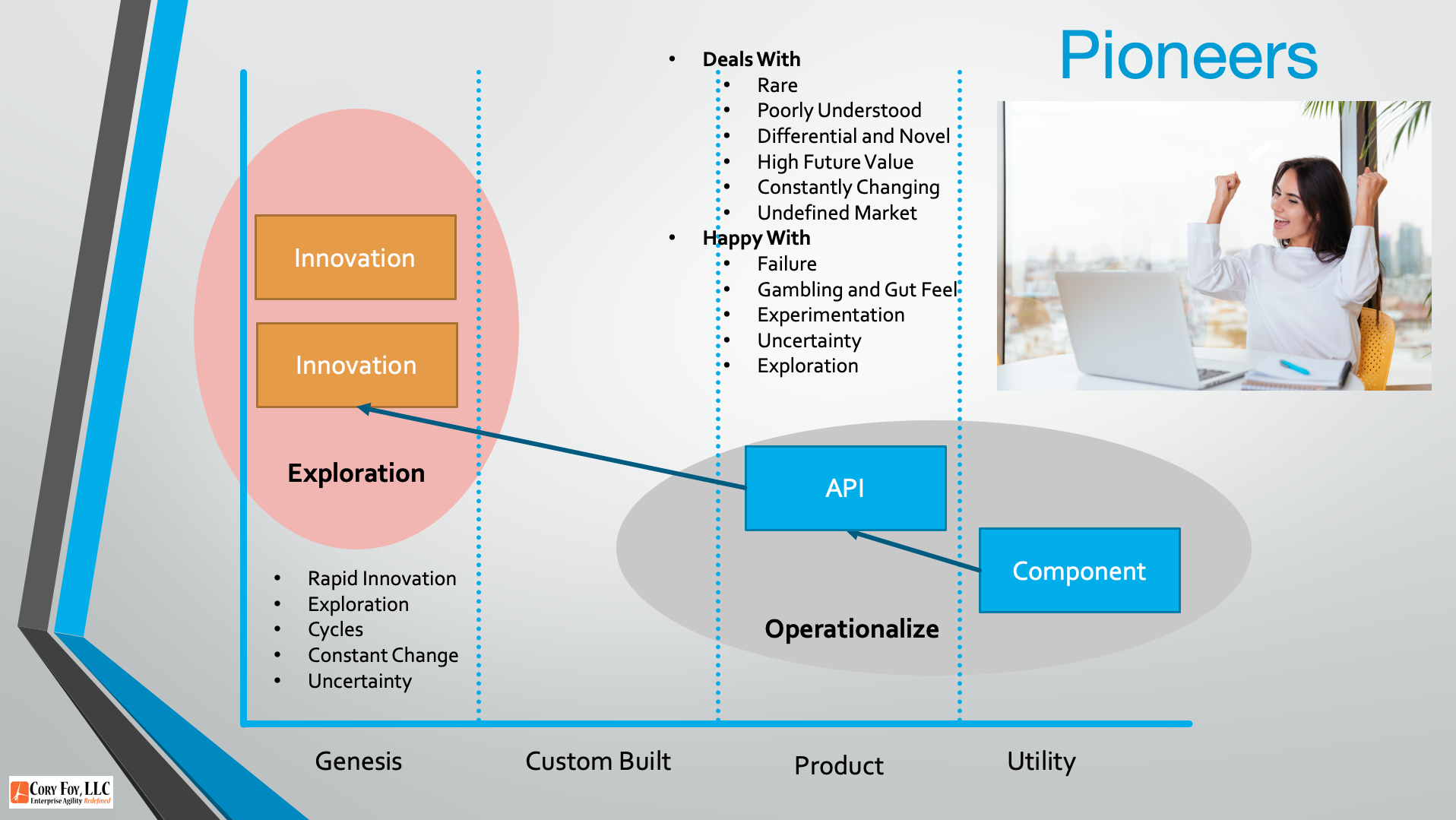Happy Mapping Monday! Today’s #mappingmondays video covers different types of roles necessary throughout the evolution – what Simon Wardley calls Pioneers, Settlers and Town Planners. As always, a full transcript is included below the video. And If you’re interested in finding out how to apply this to your organization, don’t hesitate to reach out via Twitter or email hello at coryfoy dot com!
Links:
- A great post from Simon Wardley on Pioneers, Settlers and Town Planners and “Managing in the Middle”
Transcript:
Happy Monday! Welcome to a new Mapping Monday video. I’m Cory Foy, and in today’s video I want to cover three types of roles we see in organizations, what Simon Wardley calls Pioneers, Settlers and Town Planners which is based on Robert X Cringely’s idea of Commandos, Infantry and Police.
In previous videos we’ve talked about the idea of Innovate-Leverage-Commoditize, as well as the Tower and Moat gameplay. In all of these cases, we require the ability to industrialize components and then incorporate those utility components into novel, uncharted components, which we can then leverage and commoditize.
However, the people we need to industrialize components are not typically the same as those we would expect to create novel ideas based on those components. Nor would we expect those people to be the types of people who can take a novel idea and find a market for it. So that means the type of gameplay we want to employ depends heavily on the types of people we have in place.
Let’s start with an existing productized component which we want to build an ILC / Tower and Moat type play on top of. We have an API we want to expose to a broader audience for people to incorporate into their innovations. Immediately we think about the operationalization of this component. It has to work well. It has to be scalable and fast. We want it to have significant uptime since upstream components will rely on it – but we also want to make sure we’re paying attention to the cost of running the service.
To make this work, we need people who are metric driven, happy with amazing operational efficiencies and analytics, and know how to model scenarios and respond to them. These are what Wardley refers to as ‘Town Planners’. For example, in most cities you have stoplights, but the timing of those stoplights is often decided through careful modeling by engineers who work though and measure the complexity of the interactions between the traffic, stop lights, and the roads.
Once we have a stable, scalable API, we need to find the innovations which are going to work on top of it. This search for a business model which solves our user needs requires rapid innovation, exploration and cycles. We’re going to be operating from a position of uncertainty in an market which isn’t yet defined and is likely constantly changing.
To make this work, we need people who are comfortable with failure, experimentation, uncertainty and driving from a cycle between user needs and gut feel. These people – known as Pioneers in Wardley’s terms – are path finders looking for novel approaches. These are the kinds of people comfortable building a building and putting no sidewalks in, then watching where people walk to figure out the best place to put the paths.
Once we have something which is gaining traction, we need to start leveraging and commoditizing it. Typically our pioneers like being able to explore, not productize. So for this, we need people who can watch market reactions, who can understand differentiation between products, and know how to take an interested customer and grow that interest throughout their organization. This last group – known as Settlers – are able to spot trends, like the paths stomped in the grass. They can listen and synthesize feedback, and know how to make success happen and constantly improve a product. These are going to be the people leveraging the work from the pioneers and making our innovations into marketable products.
So zooming out, successful plays like ILC and Tower and Moat are going to require a mix of capabilities which you may not be used to exercising. In a typical business, you may trend settlers into town planners. Or you may be a startup filled with pioneers wanting to make a long term play. In all of these cases, it’s important to look at the skills and approaches you’ll need to enable whatever gameplay you go after.
Hope you’ve enjoyed this video! If you’re interested in learning more about applying mapping and strategy within your organization feel free to reach out on Twitter at @cory_foy or via email at hello at coryfoy dot com. And be sure to check out all of the Mapping Monday blog posts on my site. Have a great week!
